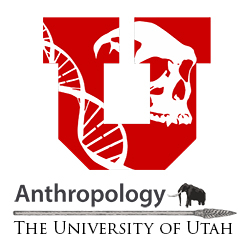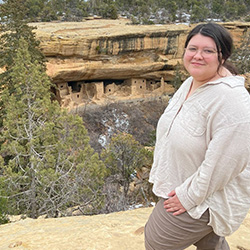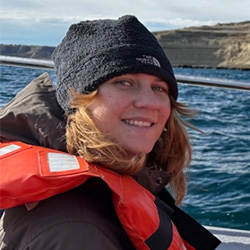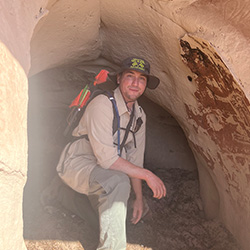OPPORTUNITIES
Undergraduate Research
Undergraduate Research Assistants
Ana Chavez
Mentor(s): B. Codding, K. Wilson
Interest:
Wilkes Climate Scholar
Sophia Dodge
Mentor(s): A. Greenwald
Interest:
Wilkes Climate Scholar
Auriana Dunn
Mentor(s): K. Cole, K. Sokolowski
Interest:
Wilkes Climate Scholar
UROP
Jane Damstedt
Mentor(s): K. Cole
Interest:
Wilkes Climate Scholar
UROP
Ethan Reid
Mentor(s): K. Cole, D. Dalmas
Interest:
UROP
Matthew Eisenberg
Mentor(s): B. Codding
Interest:
UROP
Kayta Guillory
Mentor(s): B. Codding
Interest:
UROP
Research with Faculty and Graduate Students
The UUAC provides many opportunities for Undergraduate students to become involved with research, including both fieldwork and lab settings. Students interested in general research experience should contact Ishmael Medina. For work with a specific faculty member or graduate student, please reach out to them directly to see if there are opportunities to get involved in their research. The Department of Anthropology Advisor, Shawn Carlyle, also maintains a list of faculty research opportunities as a resource for undergraduate students.
Student Independent Research Group (S.I.R.G.)
S.I.R.G. class sections are intended for students interested in independent, archaeology-based research projects under faculty supervision. Students may choose between 1 and 3 credit hours per S.I.R.G. course work during a semester. University expectations are that 3 hours of study/research work per week per credit hour received. Reach out to the individual faculty member you are interested in working with for more information.
Grants & Funding
Undergraduate Research Opporunities Program
Students are encouraged to apply to the Undergraduate Research Opportunities Program. UROP provides a $1,200 stipend for 120 hours of research over the course of a semester and educational programming for students who assist with a faculty member’s research or who carry out a project of their own under the supervision of a faculty member. Interested students should seek out a member of the UUAC Faculty to discuss possible projects and to prepare an application for UROP. A list of UUAC project that were funded by UROP can be viewed below.
Auriana Dunn & Brian Codding, Spring 2025. Stable Isotope Analysis of Archaeological Sea Otter Remains from Pecho Coast.
Matthew Eisenberg & Brian Codding, Spring 2025.Understanding the Distribution of Ancient Granaries in the Grand Staircase-Escalante National Monument.
Jane Damstedt & Kasey Cole, Spring 2025. Archeological Insights into Native Ecology: Analyzing Osteological Remains with an Emphasis on Beavers to Inform Ecological Restoration Efforts.
Kayta Guillory & Brian Codding, Spring 2025. Obsidian sourcing of Twilight Basin Obsidian: expanding obsidian sourcing models using pXRF data.
Ethan Reid & Kasey Cole, Summer 2024. Using Wyoming ground squirrel burrows to determine if surface artifact density accurately represents subsurface artifact density.
Emily Cebrowski & Brian Codding, Spring 2020. Weary feet and flaked stone Part II: Investigation of the labor-leisure economy of prehistoric foragers.
Shelby Dibble & Brian Codding, Spring 2020. Environmental Factors Drive Spatial Variation in Evidence of Prehistoric Conflict: Tests of Hypotheses in the Bears Ears National Monument.
Ishmael Medina & Brian Codding, Spring 2020. The Impacts of Ancient Maize Agriculture in Utah.
Crystal Spagnuolo & Brian Codding, Spring 2020. Establishing Temporal Distribution for Ceramics of the Virgin River Branch of the Ancestral Puebloan.
Fallon Akerson & Brian Codding, Spring 2019. Pottery Distribution within Bears Ears.
Roxanne Lois Lamson & Brian Codding, Spring 2019. Using the Gini in the Bottle: Can the Gini Coefficient detect Social Inequality in Prehistoric Basin-Plateau Populations?
Michael Jack Broughton & Jack Broughton, Spring 2019. Prehistoric Resource Depression of California Tule Elk: A Test with the King Brown Fauna.
Lauren Lewis & Lisbeth Louderback, Spring 2019. Starch Grain Analysis Of Food Processing Technology In Cowboy Cave, Utah.
Spencer Claflin & Rick Paine, Spring 2019. Categorization of Northern Central European Holocene skeleton database.
Emily Cebrowski & Brian Codding, Fall 2019. Weary feet and flaked stone: Testing the predictive power of the Ideal Free Distribution Model for archaeological sites using Central Place Foraging Theory and least cost path travel corridors.
Michael Jack Broughton & Jack Broughton, Spring 2018. Prehistoric Resource Depression of California Tule Elk: A Test with the King Brown Fauna.
April Keene & Jack Broughton, Spring 2018. Black Bones: A New Method for Distinguishing Burned from Stained Bones Applied to an Archaeological Assemblage.
Molly Wabel & Brian Codding, Fall 2018. Environmental Determinants of Traditional Biomass Harvesting in Southern Utah.
Kaley Tucker & Brian Codding, Summer 2017. Patterns of prehistoric Lithic Tool abandonment in the Dolores River Valley.
Savanna Agardy & Brian Codding, Spring 2017. Archaeological Obsidian Sourcing as a Mechanism for Prearchaic Mobility Patterns in the Great Basin Region.
Christopher Haisley & Brian Codding, Spring 2017. To Guard or Not to Guard? Explaining Territorial Behavior in Foraging Populations.
Olivia Juarez & Brian Codding, Spring 2017. From Food Waste to Hunger Relief: A Novel Approach to Food Recovery.
Dori Peers & Brian Codding, Spring 2017. Australian Aboriginal Ethno linguistics.
April Keene & Jack Broughton, Spring 2017. Macroscopic Comparison between Burned and Stained Bone: an experiment.
Jessie Eng & Brian Codding, Fall 2016. Using Remote Sensing to Analyze the Fire Regimes of the Hadza.
Austin Holmes & Brian Codding, Fall 2016. Examining the Disproportionate Impacts of Uranium Mining Relating to Socioeconomic Status on and off the Navajo Nation.
Dori Peers & Brian Codding, Fall 2016. Australian Aboriginal Ethno linguistics.
Roxanne Lebenzon & Jack Broughton, Fall 2016. El Niño influences on Holocene woodrat (Neotoma) abundance in coastal Baja California, Mexico.
Austin Holmes & Brian Codding, Summer 2016. Examining the Disproportionate Impacts of Extractive Industries Relating to Socioeconomic Status on and off the Navajo Nation.
John Myler & Lisbeth Louderback, Summer 2016. Archaeobotanical Evidence from a Post-Fremont Burial in the San Juan River Basin, Utah.
The Wilkes Center for Climate Science & Policy
The Wilkes Scholars Program (WSP) enables outstanding undergraduate students to explore pressing climate challenges facing our state, region, and planet through transformative research. Wilkes Scholars will work with a mentor to advance research related to the mission of the Wilkes Center for Climate Science and Policy — catalyzing innovative science and solutions to address climate change.
Auriana Dunn & Kasey Cole, Summer 2024 (Renewed). Comparing Historical and Modern Mammal Distribution at Bear River Basin: Has climate had an effect?
Jane Damstedt & Kasey Cole, Summer 2024 (Renewed). Using Past Ecosystems to Understand Modern Climate Change: A Casae Study from Utah's House Mountain Range.
Sophia Dodge & Alexandra Greenwald, Fall 2023. Gamble Oak Acorns as a Food Resource in the Great Basin, Colorado Plateau, and Southwest
Auriana Dunn & Kasey Cole, Fall 2023. Comparing Historical and Modern Mammal Distribution at Bear River Basin: Has climate had an effect?
Ana Chavez & Brian Codding, Fall 2023 (Renewed). Long-term Human and ecosystem adaptations to climate change in the Rockies (Utah) over the past 12,000 years.
Jane Damstedt & Kasey Cole, Fall 2023. Using Past Ecosystems to Understand Modern Climate Change: A Casae Study from Utah's House Mountain Range.
Ana Chavez & Brian Codding, Spring 2023. Long-term Human and ecosystem adaptations to climate change in the Rockies (Utah) over the past 12,000 years.




